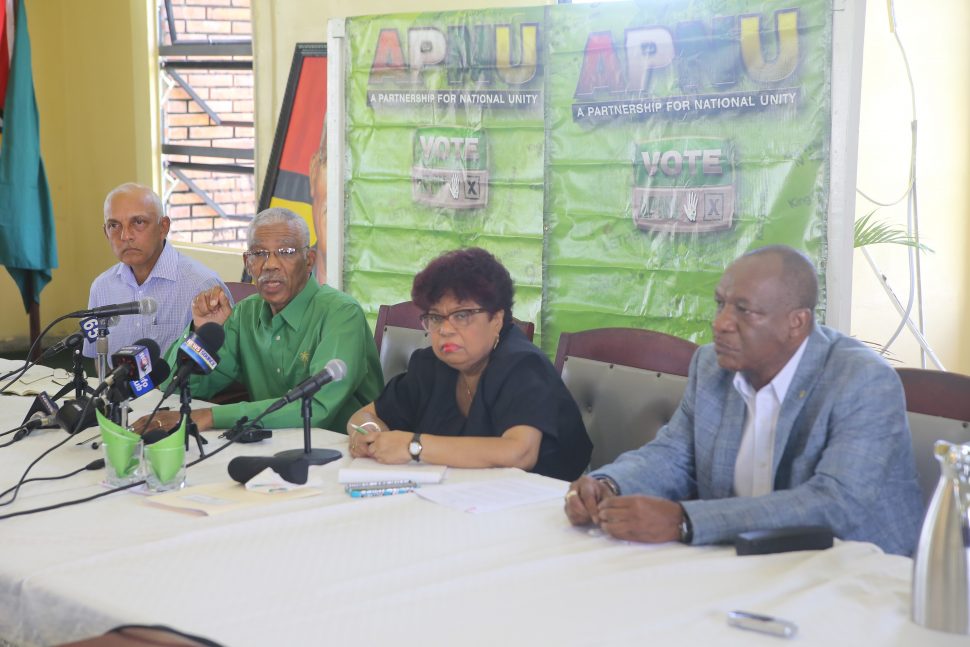A Partnership for National Unity (APNU) launched its campaign for the November 12th local government elections yesterday but with only a week to go before nominations, it has yet to identify candidates who will be contesting although it assured that all five of its constituent parties would be involved.
The coalition will also not field candidates in four Local Government Areas (LGA). As part of the APNU+AFC coalition in 2016, APNU fielded candidates in all but three of the 71 LGAs contested during those elections. This year, APNU on its own, will not field candidates in four out of 80 LGAs where polls will be held.
Campaign manager Amna Ally told reporters a launch yesterday at Congress Place, Sophia that the party will not be contesting in one LGA in Region Three (West Demerara/Essequibo Islands), two in Region Six (East Berbice/Corentyne) and one on the East Bank of Demerara. She refused to identify the specific LGAs.
APNU has leveraged its extensive machinery to garner support from, and for several smaller civil society groups. President David Granger, who leads APNU, yesterday defended the coalition’s presence in the local government elections, arguing that a larger party system offers better mobilisation and assurance that local issues can reach central government or be adequately represented in Parliament.
“Persons who put themselves up to be elected as candidates need to be able to mobilise members of that community, they need to be able to go door-to-door, house-to-house; they need to be able to conduct registration. This is not a cake walk and people who do not have that ability or interest will find that their candidacy or campaign will come to a sticky end,” he said. “The voters themselves want to know that year after year, they can contact the person that they elected [and] people feel confident in knowing that when they support a party, that party can go to central government and go to the National Assembly and represent their interest,” he added.
Granger also maintained that the partnership encourages people who do not belong to APNU to come in and work with them even as they campaign as independents.
Ally said yesterday that APNU is offering support to several civil society groups including some in areas where they themselves are not fielding candidates. “Even though we may contend that we are not participating in four of the areas, we are also giving support to independent candidates who are participating in the elections because not every person is a political animal but we give support to civic groups and to other individuals,” she said.
APNU General Secretary Joseph Harmon also explained to Stabroek News that each of these civil groups are required to sign a “statement of principles,” through which they officially agree to adhere to the democratic principles of APNU before they have access to the party machinery.
During the press conference, Ally refused to provide an estimate of the projected cost of the election campaign and the source of its funding. The question posed by Stabroek News was met with loud reproaches from several members of APNU, who were present at the press conference.
According to those persons, the reporter was “too fast” and going “too far” with the question. Ally stated that “in terms of cost of campaign and so on, I would not be able to give you that at the moment.”
APNU was also unable to shed any light as to whether members of the coalition aside from the Peoples’ National Congress Reform (PNCR) will be represented on the ballots come November 12th. According to Granger, APNU has support from the Guyana Action Party (GAP), National Front Alliance (NFA) and the Working People’s Alliance (WPA) and the Justice For All Party (JFAP).
“All of the APNU parties, of which there are five, are involved in the campaign,” he said, before adding that “the candidates are selected by the people. We don’t know who the candidates are as yet…They will come forward. They are part of the Partnership and if they are part of the Partnership and they are selected by their constituents, the Partner-ship will support them. That’s democracy.”






